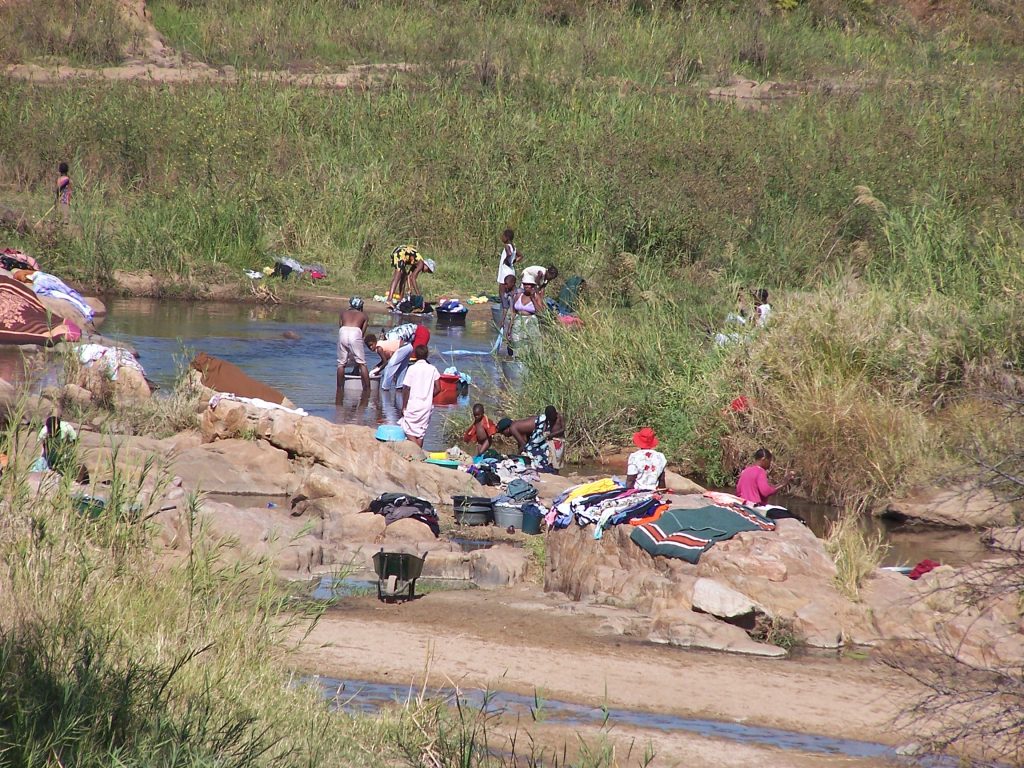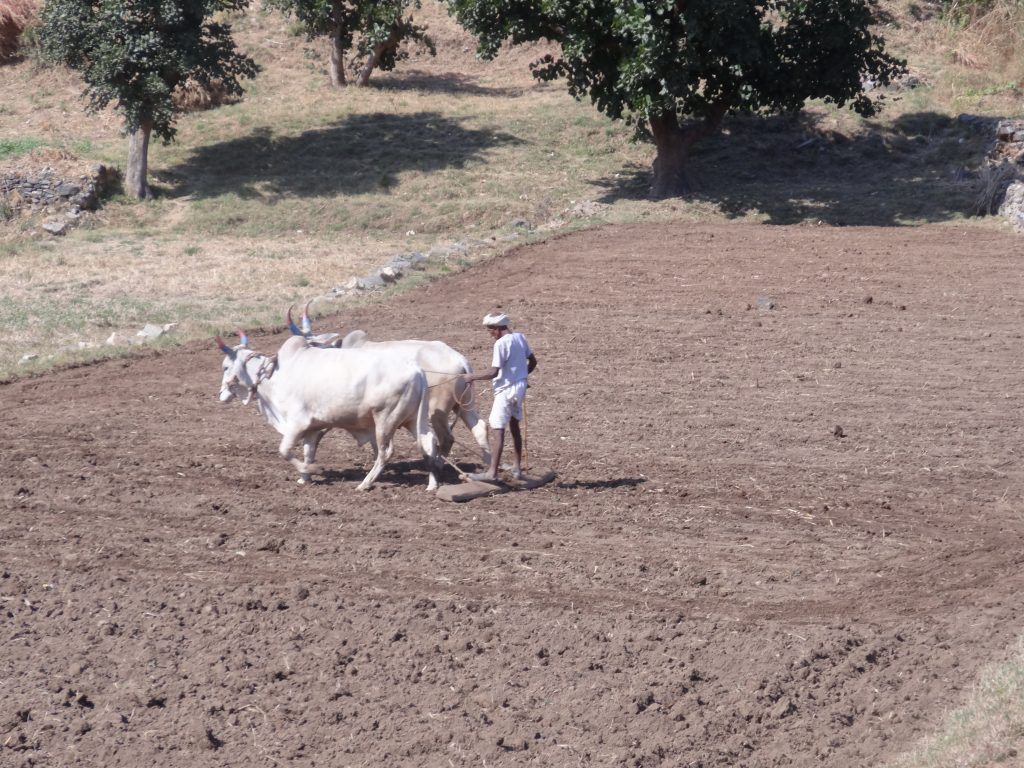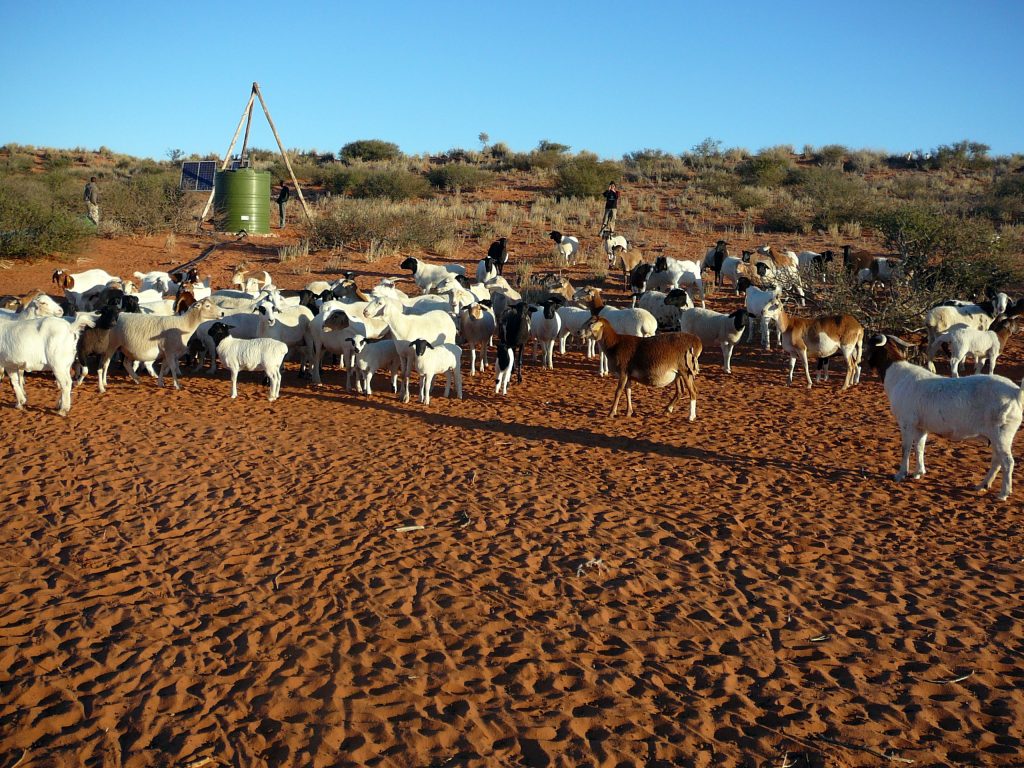Water availability constrains humanity’s ability to meet the future food and energy needs of a growing and increasingly affluent human population. It also plays an important role in the production of energy, from both renewable sources and fossil fuels, particularly from unconventional deposits, which will likely become increasingly important in the near future. Competition for water between food and energy production is a fundamental aspect of the ‘food-energy-water nexus’. Such a competition is critically important to the study of food and water security, the analysis of agricultural resources needed to feed the global population, and the study of the way they can be used more efficiently to eradicate undernourishment and improve environmental sustainability. Our group is investigating multiple components of the food-energy-water nexus, the resilience of the global water and food systems, and the options humanity has to meet food and energy security with the limited renewable water resources of the planet.

- D’Odorico, P., K.F. Davis, L. Rosa, J.A. Carr, D. Chiarelli, J. Dell’Angelo, J.A. Gephart, G.K. MacDonald, D.A. Seekell, S Suweis, M.C. Rulli, 2018. “The global food-energy-water nexus”, Reviews of Geophysics, 56, 456–531, https://doi.org/10.1029/2017RG000591.
- D’Odorico, P. (2018), The challenges of meeting future food, energy, and water needs, Eos, 99, https://doi.org/10.1029/2018EO098891.
- Rosa, L., M.C. Rulli, K.F. Davis, D. Chiarelli, C. Passera, P. D’Odorico, 2018. “Closing the yield gap while ensuring water sustainability”, Environm. Res. Lett., 13 104002. https://iopscience.iop.org/article/10.1088/1748-9326/aadeef/meta.
- Rosa, L., D.D. Chiarelli, M. Sangiorgio, A.A. Beltran-Peña, M.C. Rulli, P. D’Odorico, and I. Fung (2020). “Potential for sustainable irrigation expansion in a 3C warmer climate”, Proc. Natnl. Acad. Sci. USA, https://doi.org/10.1073/pnas.2017796117.
- Rosa, L., D.D. Danilo Chiarelli, M.C. Rulli, J. Dell’Angelo, and P. D’Odorico (2020). “Global agricultural economic water scarcity”, Science Advances, 6: eaaz6031. https://www.science.org/doi/10.1126/sciadv.aaz6031.
- Nagaraj, D., E. Proust, A. Todeschini, M.C. Rulli, and P. D’Odorico (2021). “A new dataset of global irrigation areas from 2001 to 2015”, Adv. Water. Resour. 152, 103910, https://doi.org/10.1016/j.advwatres.2021.103910.
- Rosa, L., D.L. Sanchez, G. Realmonte, D. Baldocchi, P. D’Odorico (2021). “The water footprint of carbon capture and storage technologies”, Renewable & Sustainable Energy Reviews, 138, https://doi.org/10.1016/j.rser.2020.110511.
- Rosa, L., M.C. Rulli, S. Ali, D. Chiarelli, J. Dell’Angelo, N. Mueller, A. Scheidel, G. Siciliano, and P. D’Odorico, (2021). “Energy implications of the 21st century agrarian transition”, Nature Communications, 12 (1), 1-9. https://www.nature.com/articles/s41467-021-22581-7.
- Wang, L., and P. D’Odorico (2019). “Water limitations to large-scale desert agroforestry projects for carbon sequestration”, Proceedings of the National Academy of Science U.S.A., pnas.org/cgi/doi/10.1073/pnas.1917692116.
- Davis, K. F., Rulli, M. C., Seveso, A., & D’Odorico, P. (2017). Increased food production and reduced water use through optimized crop distribution. Nature Geoscience, 10(12), 919-924.
- D’Odorico, P., Natyzak, J. L., Castner, E. A., Davis, K. F., Emery, K. A., Gephart, J. A., … & Galloway, J. N. (2017). Ancient water supports today’s energy needs. Earth’s Future, 5(5), 515-519.
- Rosa, L., Davis, K. F., Rulli, M. C., & D’Odorico, P. (2017). Environmental consequences of oil production from oil sands. Earth’s Future, 5(2), 158-170.
- Davis, K. F., Rulli, M. C., Garrassino, F., Chiarelli, D., Seveso, A., & D’Odorico, P. (2017). Water limits to closing yield gaps. Advances in water resources, 99, 67-75.
- Davis, K. F., Gephart, J. A., Emery, K. A., Leach, A. M., Galloway, J. N., & D’Odorico, P. (2016). Meeting future food demand with current agricultural resources. Global Environmental Change, 39, 125-132.
- Rulli, M. C., Saviori, A., & D’Odorico, P. (2013). Global land and water grabbing. Proceedings of the National Academy of Sciences, 110(3), 892-897.
- Davis, K. F., & D’Odorico, P. (2015). Livestock intensification and the influence of dietary change: A calorie-based assessment of competition for crop production. Science of the Total Environment, 538, 817-823.
- Palmer, M. A., Liu, J., Matthews, J. H., Mumba, M., & D’Odorico, P. (2015). Manage water in a green way. Science, 349(6248), 584-585.
- Davis, K. F., D’Odorico, P., & Rulli, M. C. (2014). Moderating diets to feed the future. Earth’s Future 2, 559–565.
- Gephart, J. A., Pace, M. L., & D’Odorico, P. (2014). Freshwater savings from marine protein consumption. Environmental Research Letters, 9(1), 014005.
Globalization of water through trade and transnational investments
Water is a major resource constraining food production in many regions around the world. Its global distribution depends on geographic conditions but can be modified by humans through mechanisms of globalization, such as trade and foreign direct investments. The increasing global demand for farmland products is placing unprecedented pressure on the global agricultural system and has recently led to episodic food crises. New bioenergy policies, changes in diets, and population growth have eroded the ability to cope with shocks in the global food system. Several countries are not self-sufficient and their water and food security strongly depends on trade, which becomes unreliable when the supplies in the international food market are scarce. As a result, investments in agriculture have become a priority for a number of governments and corporations that are trying to expand their agricultural production while securing good profits. Despite the recognized importance of the role of trade and land acquisitions in global and regional food, energy, and water security, the societal reliance on domestic production and international trade remains poorly quantified. Our group is investigating how societies virtually affect their access to water for food and energy production, and is analyzing the consequent impacts on societal resilience, environmental stewardship, and the sustainability of rural livelihoods.

- Hartman, S., Chiarelli, D. D., Rulli, M. C., & D’Odorico, P. (2021). A growing produce bubble: United States produce tied to Mexico’s unsustainable agricultural water use. Environmental Research Letters, 16(10), 105008.
- Müller M., G. Penny, M. T. Niles, V. Ricciardi, D. D. Chiarelli, K.F. Davis, J. Dell’Angelo, P. D’Odorico, L. Rosa, M.C. Rulli, N. D. Mueller (2021). “Impact of Transnational Land Acquisitions on Local Food Security and Dietary Diversity”, Proc. Natnl. Acad. Sci. USA, 118 (4) e2020535118; DOI: 10.1073/pnas.2020535118.
- D’Odorico, P., D.D. Chiarelli, L. Rosa, A. Bini, D. Zilberman, and M.C. Rulli (2020). “The global value of water in agriculture”, Natnl. Acad. Sci. USA,17(36) 21985-21993, www.pnas.org/cgi/doi/10.1073/pnas.2005835117.
- Beltran-Peña, A. A., L. Rosa, and P. D’Odorico, (2020). “Global food self-sufficiency in the 21st century under sustainable intensification of agriculture”, Environm. Res. Lett., 15(9) 095004 https://iopscience.iop.org/article/10.1088/1748-9326/ab9388.
- Kinnunen, P., J. H. A. Guillaume, M. Taka, P. D’Odorico, S. Siebert, M. J. Puma, M. Jalava, M. Kummu (2020). “Local food crop production can fulfil demand for less than one-third of population”, Nature Food, 1, 229-237. https://www.nature.com/articles/s43016-020-0060-7?proof=tr.
- Tu, C., S. Suweis, and P. D’Odorico, (2019). “Impact of globalization on the resilience and sustainability of natural resources”, Nature Sustainability, 2, 283–289. https://www.nature.com/articles/s41893-019-0260-z.
- Rosa, L., D. Chiarelli, C. Tu, M.C. Rulli, and P. D’Odorico, (2019). “Global unsustainable virtual water flows in agricultural trade”, Environm. Res. Lett., 14, 114001. https://iopscience.iop.org/article/10.1088/1748-9326/ab4bfc.
- D’Odorico, P., J.A. Carr, C. Dalin, J. Dell’Angelo, M. Konar, F. Laio, L. Ridolfi, L. Rosa, S. Suweis, M. Tuninetti, (2019). Global virtual water trade and the hydrological cycle: Patterns, drivers, and socio-environmental impacts, Environmental research Letters, 14, 053001. https://doi.org/10.1088/1748-9326/ab05f4.
- Dell’Angelo, J., Rulli, M. C., & D’Odorico, P. (2018). The global water grabbing syndrome. Ecological Economics, 143, 276-285.
- D’Odorico, P., Rulli, M. C., Dell’Angelo, J., & Davis, K. F. (2017). New frontiers of land and water commodification: Socio‐environmental controversies of large‐scale land acquisitions. Land Degradation & Development, 28(7), 2234-2244.
- Dell’Angelo, J., D’Odorico, P., & Rulli, M. C. (2017). Threats to sustainable development posed by land and water grabbing. Current Opinion in Environmental Sustainability, 26, 120-128.
- Dell’Angelo, J., D’odorico, P., Rulli, M. C., & Marchand, P. (2017). The tragedy of the grabbed commons: coercion and dispossession in the global land rush. World Development, 92, 1-12.
- Carr, J. A., D’Odorico, P., Suweis, S., & Seekell, D. A. (2016). What commodities and countries impact inequality in the global food system?. Environmental Research Letters, 11(9), 095013.
- Chiarelli, D. D., Davis, K. F., Rulli, M. C., & D’Odorico, P. (2016). Climate change and large-scale land acquisitions in Africa: Quantifying the future impact on acquired water resources. Advances in water resources, 94, 231-237.
- Davis, K. F., Yu, K., Rulli, M. C., Pichdara, L., & D’Odorico, P. (2015). Accelerated deforestation driven by large-scale land acquisitions in Cambodia. Nature Geoscience, 8(10), 772-775.
- D’Odorico P. and M.C. Rulli, “The land and its people”, Nature Geoscience, 4: 324-325, 2014.
- O’Bannon, C., J.A. Carr, D.A. Seekell, and P. D’Odorico, “Globalization of agricultural pollution due to international trade”, Hydrol. Earth Syst. Sci., 18, 503–510, doi:10.5194/hess-18-503-2014, 2014 [*].
- Rulli, M.C. and P. D’Odorico, “The water footprint of land grabbing”, Geophys. Res. Lett. 40, 1–6, doi:10.1002/2013GL058281, 2013.
- D’Odorico P. and M.C. Rulli, “The fourth food revolution”, Nature Geoscience, 6, 417-418, doi 10.1038/ngeo1842, 6(6), 417-418, 2013.
- Rulli, M.C., A. Saviori, and P. D’Odorico, “Global land and water grabbing”, Proc. Natnl Acad. Sci, USA, PNAS, doi: 10.1073/pnas.1213163110, 2013.
- Carr, J.A., P. D’Odorico, F. Laio, L. Ridolfi, “Recent history and geography of virtual water trade”, PLoS-ONE, /8(2): e55825. doi:10.1371/ journal.pone.0055825, 2013.
- D’Odorico P., J. A. Carr, F. Laio, and L. Ridolfi, “Spatial organization and drivers of the virtual water trade: A community-structure analysis”, Environm. Res. Lett., 7, 034007, doi:10.1088/1748-9326/7/3/034007, 2012.
- Carr, J.A., P. D’Odorico, F. Laio, and L. Ridolfi, “On the Temporal variability of the virtual water network”, Geophys. Res. Lett. doi: 39, L06404, doi:10.1029/2012GL051247, 2012.
Resilience of the water-food system
Most food production depends, directly or indirectly, on freshwater resources. In the absence of importation of food commodities, population growth is constrained by the availability of local resources—including water—as well as by cultural and health‐related factors. The global trade of massive amounts of food makes societies less reliant on locally available water resources, thereby allowing some populations to exceed the limits posed by their local water budget. Thus, international trade implies a virtual transfer of water resources from areas of food production to importing regions. While it is recognized that in the short term this globalization of (virtual) water resources may prevent malnourishment, famine, and conflicts, its long‐term effects on the coupled human-natural system remain poorly investigated. Our group is studying the effect of the uncontrolled trade of food products on the resilience of human societies with respect to drought and famine. Our results suggest that in the long run the globalization of water resources reduces the societal resilience with respect to water limitations in that it increases exposure to shocks, reduces redundancies, and ultimately leaves fewer options available to cope with exceptional droughts and crop failure.

- Tu, C., P. D’Odorico, and S. Suweis (2021). “Dimensionality reduction of complex dynamical systems”, iScience, 24, 101912.
- Hassani A., A. Azapagic, P. D’Odorico, A. Keshmiri , N. Shokri, (2020). “Desiccation crisis of saline lakes: A new decision-support framework for building resilience to climate change”, Science of Total Environment, 703(10), 134718.
- Heslin, A., M. Puma, P. Marchand, J.A. Carr, J. Dell’Angelo, P. D’Odorico, J. A. Gephart, M. Kummu, M. Porkka, M.C. Rulli, D. A. Seekell, S. Suweis, A. Tavoni, (2020), “Simulating the cascading effects of an extreme agricultural production shock: global implications of a contemporary US Dust Bowl event”, Frontiers in Sustainable Food Systems, 4(26).
- Tu, C., S. Suweis, and P. D’Odorico, (2019). “Impact of globalization on the resilience and sustainability of natural resources”, Nature Sustainability, 2, 283–289. https://www.nature.com/articles/s41893-019-0260-z.
- Seekell, D.A., J. Carr, J. Dell’Angelo, P. D’Odorico, M. Fader, J. Gephart, R.P. Korzeniewicz, M. Kummu, N. Magliocca, M. Porkka, C. Prell, M. Puma, Z. Ratajczak, M.C. Rulli, S. Suweis, A Tavoni, “Resilience in the global food system”, Envionm. Res. Lett., 12, 2017.
- Laio F., L. Ridolfi, and P. D’Odorico, “Past and future of food stocks”, Environm. Res. Lett., 11, 035010, 2016.
- Marchand P., J. A. Carr, J. Dell’Angelo, M. Fader, J.A. Gephart, M. Kummu, N. R. Magliocca, M. Porkka, M. J. Puma, Z. Ratajczak, M. C. Rulli, D.A. Seekell, S. Suweis, A. Tavoni, P. D’Odorico, “Reserves and trade jointly determine exposure to food supply shocks”, Environm. Res. Lett., 11, 095009, doi:10.1088/1748-9326/11/9/095009, 2016.
- Fader, M., M.C. Rulli, J. Carr, J. Dell’Angelo, P. D’Odorico, J. Gephart, M. Kummu, N. Magliocca, M. Porkka, C. Prell, M. Puma, Z. Ratajczak, D.A. Seekell, S. Suweis, A. Tavoni, “Past and present biophysical redundancy of countries as a buffer to changes in food supply”. Environm. Res. Lett.,11, 055008, 2016.
- Suweis, S., J.A. Carr, A. Rinaldo, A. Maritan, and P. D’Odorico, “Resilience and reactivity of global food security”, Proc. Natnl. Acad. Sci., USA, PNAS, doi: 10.1073/pnas.1507366112, 2015.
- Suweis S. and P. D’Odorico, “Early warning signs in social-ecological networks”, PLoS-One, 9(7): e101851. doi:10.1371/journal.pone.0101851, 2014.
- Suweis, S., A. Rinaldo, A. Maritan, and P. D’Odorico, “Water-controlled wealth of nations”, Proc. Natnl Acad. Sci, USA, PNAS, 110(11), 4230-4233, doi: 10.1073/pnas.1222452110, 2013.
- D’Odorico P., F. Laio, L. Ridolfi, “Does globalization of water reduce societal resilience to drought?”, Geophys. Res. Lett. 37, L13403, doi:10.1029/2010GL043167, 2010.
Water Justice
The global distributions of water availability and population density are uneven and therefore inequality exists in human access to freshwater resources. Is this inequality unjust or only regrettable? To examine this question our group is formulating and evaluating elementary principles of water ethics relative to human rights for water, and investigating how global trade could improve societal access to water by transferring ‘virtual water’ embedded in plant and animal commodities.

- Tatlhego, M., and P. D’Odorico, “Are African irrigation dam projects for large-scale agribusiness or small-scale farmers?”, Environm. Res, Comm., https://iopscience.iop.org/article/10.1088/2515-7620/ac2263.
- Jenkins, W., L. Rosa, J. Schmidt, L. Band, A. Beltran-Peña, A. Clarens, S. Doney, R. Emanuel, A. Glassie, J. Quinn, M. C. Rulli, W. Shobe, L. Szeptycki, and P. D’Odorico (2021), “Values-Based Scenarios of Water Security: Rights to Water, Rights of Waters, and Commercial Water Rights”, Bioscience, 20, biab088, https://doi.org/10.1093/biosci/biab088.
- D’Odorico P., J.A. Carr, K. F. Davis, J. Dell’Angelo, DA Seekell (2019). “Food inequality, injustice, and rights”, BioScience, 69(3), 180-190, https://doi.org/10.1093/biosci/biz002.
- Dell’Angelo, J., P. D’Odorico, and M.C. Rulli, 2018. “The Global Water Grab Syndrome”, Ecological Economics, 143, 276-285. https://doi.org/10.1016/j.ecolecon.2017.06.033.
- Carr, J.A., D.A. Seekell, and P. D’Odorico, “Inequality or injustice in water use for food?” Environm. Research Lett., 10, 024013, doi:10.1088/1748-9326/10/2/024013, 2015.
- Carr, J.A., P. D’Odorico, F. Laio, L. Ridolfi, and D. Seekell, “Inequalities in the networks of virtual water flow”, EOS,Transactions, 93(32), 309-310, 2012.
- Seekell, D.A., P. D’Odorico, M.L. Pace, “Virtual water transfers unlikely to redress inequality in global water use”, Environm. Res. Lett., 6, 024017, doi:10.1088/1748-9326/6/2/024017, 2011.
